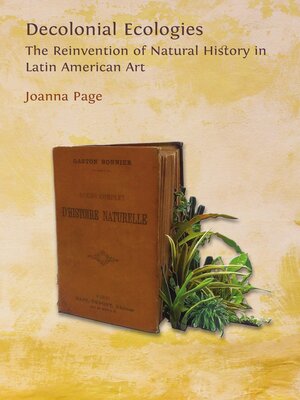Decolonial Ecologies
ebook ∣ The Reinvention of Natural History in Latin American Art
By Joanna Page

Sign up to save your library
With an OverDrive account, you can save your favorite libraries for at-a-glance information about availability. Find out more about OverDrive accounts.
Find this title in Libby, the library reading app by OverDrive.



Search for a digital library with this title
Title found at these libraries:
| Library Name | Distance |
|---|---|
| Loading... |
In Decolonial Ecologies: The Reinvention of Natural History in Latin American Art, Joanna Page illuminates the ways in which contemporary artists in Latin America are reinventing historical methods of collecting, organizing, and displaying nature in order to develop new aesthetic and political perspectives on the past and the present. Page brings together an entirely new corpus of artistic projects from Argentina, Brazil, Chile, Colombia, Ecuador, Mexico, and Peru that engage critically and creatively with forms as diverse as the medieval bestiary, baroque cabinets of curiosities, atlases created by European travellers to the New World, the floras and herbaria composed by eighteenth- and nineteenth-century naturalists, and the dioramas designed for natural history museums. She explores how artists develop decolonial and post-anthropocentric perspectives on the collections and expeditions that were central to the evolution of European natural history. Their works forge a critique of the rationalizing approach to nature taken by modern Western science, reconnecting it with forms of popular, indigenous and spiritual knowledge and experience that it has systematically excluded since the Enlightenment. Drawing on photography, video, illustration, sculpture, and installation, this vividly illustrated and lucidly written book (also available in premium quality in hardback edition) explores how these artworks might also deconstruct the apocalyptic visions of environmental change that often dominate Western thought, developing a renewed understanding of alternative ways in which humans might co-inhabit the natural world.







